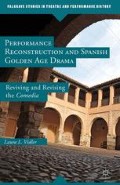Abstract
Stanley Fish challenges the theoretical turn for its inability to formulate a general hermeneutics from within the limits of culture. “Theory begins and ends in interest and raises the imperatives of interest… to the status of universals.”1 In spite of neo-pragmatism’s insistence against “the idea of doing theory at all,”2 however, Terry Eagleton advises us in After Theory that rumors of the death of theory have been greatly exaggerated.
Access this chapter
Tax calculation will be finalised at checkout
Purchases are for personal use only
Preview
Unable to display preview. Download preview PDF.
Notes
Stanley Fish, “Consequences,” Critical Inquiry 11.3 (March 1985): 439.
Steven Knapp and Walter Benn Michaels, “Against Theory,” Critical Theory 8.4 (1982): 723.
Terry Eagleton, After Theory (New York: Basic Books, 2003), 1.
Stanley Fish, Is There a Text in This Class?: The Authority of Interpretive Communities (Cambridge, MA: Harvard University Press, 1980), 276–277
See Matthew Wilkens, “Canons, Close Reading, and the Evolution of Method” in Debates in the Digital Humanities, ed. Matthew Gold (Minneapolis: University of Minnesota Press, 2012).
Martin Mueller, “Digital Shakespeare or Toward a Literary Informatics,” Shakespeare 4.3 (2008): 284–301.
Stephen Ramsay, “Toward an Algorithmic Criticism,” literary and linguistic Computing 18.2 (2003): 167–174.
Catherine Connor-Sweitlicki, “Creative Cognition for Staging Comedia,” Comedia Performance 4.1 (2007): 67
Howard Mancing, “Embodied Cognitive Science and the Study of Literature,” Cervantes, 32.1 (2012): 29.
Bruce McConachie, and Elizabeth F. Hart, Performance and Cognition: Theatre Studies and the Cognitive Turn (London: Routledge, 2006), ix–x.
Catherine Connor-Swietlicki, “Embodying Rape and Violence: Your Mirror-Neurons & 2RC Teatro’s El alcalde de Zalamea,” Comedia Performance. 1 (2010): 12.
Arthur C. Danto, “Transfiguration of the Commonplace,” The Journal of Aesthetics and Art Criticism 33.2 (Winter, 1974): 145–146.
Maryanne Wolf, Proust and the Squid: The Story and Science of the Reading Brain (New York: Harper Collins, 2007), 114–162.
Hal Whitehead, Analyzing Animal Societies: Quantitative Methods for Vertebrate Social Analysis (Chicago: University of Chicago Press, 2008), 277
See Hans-Thies Lehmann, Postdramatic Theatre. Trans. Karen Jürs-Munby (London: Routledge, 2006).
See Monroe Newborn, Kasparov v. Deep Blue: Computer Chess Comes of Age (New York: Springer, 1997).
See Howard Gardner, The Mind’s New Science: A History of the Cognitive Revolution (New York: Basic Books, 1985).
John Haugeland, Mind Design II: Philosophy, Psychology, Artificial Intelligence (Cambridge: Bradford Books/MIT Press, 1997).
Stan Franklin, Artificial Minds (Cambridge: Bradford Book/MIT Press, 1995).
M. Tim Jones, Al Application Programming, 2nd ed. (Hingham, MA: Charles River Media, 2005), 166–175.
Copyright information
© 2014 Laura L. Vidler
About this chapter
Cite this chapter
Vidler, L.L. (2014). Theory Performance. In: Performance Reconstruction and Spanish Golden Age Drama. Palgrave Studies in Theatre and Performance History. Palgrave Macmillan, New York. https://doi.org/10.1057/9781137437075_8
Download citation
DOI: https://doi.org/10.1057/9781137437075_8
Publisher Name: Palgrave Macmillan, New York
Print ISBN: 978-1-349-68391-8
Online ISBN: 978-1-137-43707-5
eBook Packages: Palgrave Media & Culture CollectionLiterature, Cultural and Media Studies (R0)

